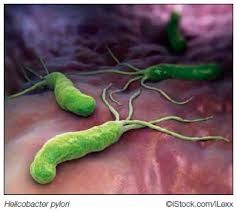Actually no one likes to be sick, but stomach ulcer is becoming a trend now in our society especially among our female folks. A little discomfort a person will feel, or maybe a heart burn from eating some kind of food, they conclude that its ulcer. Please people get diagnosed first before saying you have stomach ulcer.
For decades, doctors think people get ulcers from stress, spicy foods, smoking or other lifestyle habits. But when scientists discovered a bacterium they found that the germs were the cause of most stomach ulcers. H Pylori is the type of bacteria that causes most stomach, gastric and duodenal ulcers. The bacteria can enter the body and live in the digestive tract and afterwards they can cause sores, called ulcers, in the lining of your stomach or the upper part of the small intestine. Infection with H. pylori is common, about two-thirds of the world’s population has it in their bodies. For most people, it doesn’t cause ulcers or any other symptoms.
When H. pylori enters the body, it attacks the lining of the stomach, which usually protects the stomach from the acid your body uses to digest food. Once the bacteria have done enough damage, acid can get through the lining, which leads to ulcers. These may cause bleed.
TRANSMISSION
- pylori can be gotten from food, water, or utensils. It’s more common in countries or communities that lack clean water or good sewage systems. It can also be picked up through contact with the saliva or other body fluids of infected people. Many people get H. pylori during childhood, but adults can get it, too. The germs live in the body for years before symptoms start, but most people who have it will never get ulcers. Doctors aren’t still sure why only some people get ulcers after an infection.
SYMPTOMS
If you have an ulcer, you may feel a dull or burning pain in your belly. It may come and go, but you’ll probably feel it most when your stomach is empty, such as between meals or in the middle of the night. It can last for a few minutes or for hours. You may feel better after you eat, drink milk, or take an antacid.
Other signs of an ulcer include:
- Bloating
- Burping
- Not feeling hungry
- Nausea (feeling of vomit)
- Vomiting
- Weight loss for no clear reason
COMPLICATIONS
Ulcers can bleed into the stomach or intestines , which can be dangerous to health. Get medical help right away if these symptoms are visible:
- Stool that is bloody, dark red, or black
- Difficulty in breathing
- Dizziness
- Feeling very tired for no reason
- Pale skin color
- Vomit that has blood or looks like coffee grounds
- Severe, sharp stomach pain
It’s not common, but H. pylori infection can cause stomach cancer.
TREATMENT
If you have ulcers caused by H. pylori, you’ll need treatment to kill the germs, heal your stomach lining, and keep the sores from coming back. It usually takes 1 to 2 weeks of treatment to get better.
The options include:
- Antibiotics to kill the bacteria in your body
- Drugs that reduce the amount of acid in your stomach by blocking the tiny pumps that produce it
PREVENTION
You can protect yourself from getting H. pylori infection with the same steps you take to keep other germs by:
- Washi your hands after you use the bathroom and before you prepare or eat food. Teach your children to do the same.
- Avoid food or water that’s not clean.
- Don’t eat anything that isn’t cooked thoroughly.
- Avoid food served by people who haven’t washed their hands.
Though stress, spicy foods, alcohol, and smoking don’t cause ulcers, they can keep them from healing quickly or make your pain worse. Talk to your doctor about ways to manage your stress, improve your diet, and, if you smoke, how you can get help to quit. As more of the world gets access to clean water and sanitation, fewer people than before are getting the bacteria. With good health habits, you can protect yourself and your children from H. pylori.





